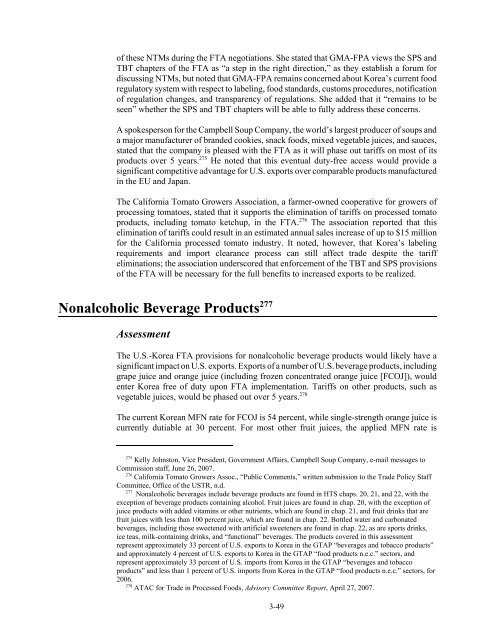U.S.-Korea Free Trade Agreement: Potential Economy-wide ... - USITC
U.S.-Korea Free Trade Agreement: Potential Economy-wide ... - USITC
U.S.-Korea Free Trade Agreement: Potential Economy-wide ... - USITC
You also want an ePaper? Increase the reach of your titles
YUMPU automatically turns print PDFs into web optimized ePapers that Google loves.
of these NTMs during the FTA negotiations. She stated that GMA-FPA views the SPS and<br />
TBT chapters of the FTA as “a step in the right direction,” as they establish a forum for<br />
discussing NTMs, but noted that GMA-FPA remains concerned about <strong>Korea</strong>’s current food<br />
regulatory system with respect to labeling, food standards, customs procedures, notification<br />
of regulation changes, and transparency of regulations. She added that it “remains to be<br />
seen” whether the SPS and TBT chapters will be able to fully address these concerns.<br />
A spokesperson for the Campbell Soup Company, the world’s largest producer of soups and<br />
a major manufacturer of branded cookies, snack foods, mixed vegetable juices, and sauces,<br />
stated that the company is pleased with the FTA as it will phase out tariffs on most of its<br />
products over 5 years. 275 He noted that this eventual duty-free access would provide a<br />
significant competitive advantage for U.S. exports over comparable products manufactured<br />
in the EU and Japan.<br />
The California Tomato Growers Association, a farmer-owned cooperative for growers of<br />
processing tomatoes, stated that it supports the elimination of tariffs on processed tomato<br />
products, including tomato ketchup, in the FTA. 276 The association reported that this<br />
elimination of tariffs could result in an estimated annual sales increase of up to $15 million<br />
for the California processed tomato industry. It noted, however, that <strong>Korea</strong>’s labeling<br />
requirements and import clearance process can still affect trade despite the tariff<br />
eliminations; the association underscored that enforcement of the TBT and SPS provisions<br />
of the FTA will be necessary for the full benefits to increased exports to be realized.<br />
Nonalcoholic Beverage Products 277<br />
Assessment<br />
The U.S.-<strong>Korea</strong> FTA provisions for nonalcoholic beverage products would likely have a<br />
significant impact on U.S. exports. Exports of a number of U.S. beverage products, including<br />
grape juice and orange juice (including frozen concentrated orange juice [FCOJ]), would<br />
enter <strong>Korea</strong> free of duty upon FTA implementation. Tariffs on other products, such as<br />
vegetable juices, would be phased out over 5 years. 278<br />
The current <strong>Korea</strong>n MFN rate for FCOJ is 54 percent, while single-strength orange juice is<br />
currently dutiable at 30 percent. For most other fruit juices, the applied MFN rate is<br />
275 Kelly Johnston, Vice President, Government Affairs, Campbell Soup Company, e-mail messages to<br />
Commission staff, June 26, 2007.<br />
276 California Tomato Growers Assoc., “Public Comments,” written submission to the <strong>Trade</strong> Policy Staff<br />
Committee, Office of the USTR, n.d.<br />
277 Nonalcoholic beverages include beverage products are found in HTS chaps. 20, 21, and 22, with the<br />
exception of beverage products containing alcohol. Fruit juices are found in chap. 20, with the exception of<br />
juice products with added vitamins or other nutrients, which are found in chap. 21, and fruit drinks that are<br />
fruit juices with less than 100 percent juice, which are found in chap. 22. Bottled water and carbonated<br />
beverages, including those sweetened with artificial sweeteners are found in chap. 22, as are sports drinks,<br />
ice teas, milk-containing drinks, and “functional” beverages. The products covered in this assessment<br />
represent approximately 33 percent of U.S. exports to <strong>Korea</strong> in the GTAP “beverages and tobacco products”<br />
and approximately 4 percent of U.S. exports to <strong>Korea</strong> in the GTAP “food products n.e.c.” sectors, and<br />
represent approximately 33 percent of U.S. imports from <strong>Korea</strong> in the GTAP “beverages and tobacco<br />
products” and less than 1 percent of U.S. imports from <strong>Korea</strong> in the GTAP “food products n.e.c.” sectors, for<br />
2006.<br />
278 ATAC for <strong>Trade</strong> in Processed Foods, Advisory Committee Report, April 27, 2007.<br />
3-49

















